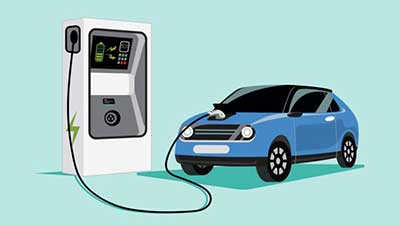Date : 01/07/2023
Relevance – GS Paper 3 – Science and Technology – Advance Technologies
Keywords – Electric Vehicles (EVs), Sustainable Transportation, Environmental Benefits, Charging Infrastructure
Context –
The era of electric vehicles (EVs) has dawned, bringing with it the promise of zero tailpipe emissions and reduced oil imports. The production and sales of EVs have witnessed a significant upswing, as major automobile manufacturers invest heavily in EV technology. Advancements in battery technology and charging infrastructure, coupled with the commitment of governments worldwide, are driving the adoption of EVs.
Environmental Benefits of EVs:
- Combating Climate Change: EVs have the potential to substantially reduce greenhouse gas emissions, as they produce zero tailpipe emissions. By curbing carbon dioxide (CO2) and other pollutants, EVs contribute to mitigating air pollution, smog, and global warming. Cleaner air enhances public health, reducing the risk of respiratory and cardiovascular diseases.
- Reduction of Harmful Pollutants: EVs also aid in decreasing harmful pollutants such as nitrogen oxides (NOx), particulate matter (PM), and volatile organic compounds (VOCs), leading to improved air quality.
Energy Diversity and Security:
- Shifting to Sustainable Energy: EVs contribute to energy diversity by reducing dependence on oil imports. As the electricity grid can be powered by renewable sources like solar and wind, EVs offer an opportunity to transition towards cleaner and more sustainable energy options. This not only reduces vulnerability to fluctuating oil prices but also enhances energy security by reducing reliance on fossil fuel imports.
Technological Advancements and Job Creation:
- Driving Technological Innovation: The development and adoption of EVs have catalyzed advancements in battery technology, electric drivetrains, and charging infrastructure. These advancements have broader applications, such as energy storage for renewables and grid stability.
- Job Creation: The growth of electric mobility has created employment opportunities in battery manufacturing, renewable energy, and charging infrastructure sectors.
Long-Term Cost Savings:
- Lower Operating Costs: EVs have lower operating costs since electricity is generally cheaper than gasoline or diesel. With fewer moving parts, they require less maintenance, leading to reduced servicing and repair expenses over time.
Decongesting Cities:
- Promoting Shared Mobility: EVs can help decongest cities by encouraging shared mobility. Shared mobility refers to using vehicles as a service rather than individual assets, reducing the number of vehicles on the road and the need for parking space.
- Compact Design: Compact and lighter EVs designed for urban spaces reduce congestion and emissions. Innovative smart EVs for shorter intra-city distances require smaller batteries, resulting in faster recharge times and lower costs.
Challenges for EVs:
High Initial Cost:
- Affordability Barrier: The upfront cost of purchasing an EV is relatively higher compared to conventional vehicles due to expensive battery technology. This limits the demand for EVs among potential buyers.
Limited Charging Infrastructure:
- Inadequate Infrastructure: The charging infrastructure in India is still in its early stages and concentrated in major cities. This lack of a robust and widespread charging network poses inconveniences for EV owners, especially those without dedicated parking spaces.
Range Anxiety:
- Perceived Limited Range: Limited driving range remains a significant challenge for EV adoption, as there is a perception that EVs may not offer sufficient range for long-distance travel, especially in a country with vast distances like India. Battery degradation over time further exacerbates this concern.
Battery Technology and Supply Chain:
- Import Dependence: India heavily relies on imports for battery manufacturing, posing supply chain challenges. Additionally, longer charging times compared to refueling conventional vehicles affect the convenience and usability of EVs.
Limited Model Options:
- Need for Diverse Options: Currently, the availability of EV models in India is limited compared to conventional vehicles. A broader range of affordable
EVs are necessary to cater to diverse consumer preferences and requirements.
Government Initiatives to Promote EVs
- Faster Adoption and Manufacturing of (Hybrid &) Electric Vehicles (FAME): FAME offers financial incentives for purchasing EVs and developing charging stations.
- Production-linked Incentive (PLI) Scheme for Automotive Industry: Boosting domestic manufacturing of EVs, fuel-cell vehicles and associated components.
- National Programme on Advanced Chemistry Cell Battery Storage: PLI scheme to promote domestic manufacturing of EV batteries.
- GST Reduction: GST rate is 5% on all EVs as compared to 28% tax on ICE vehicles.
- Income Tax Concession: Deduction of up to Rs. 1.5 lakh for the interest paid on financing an electric vehicle.
- Draft Battery Swapping Policy: Replacing depleted batteries (2W, 3W) with charged ones at swapping stations.
- Charging Infrastructure Guidelines: Availability of different types of charging connectors at public charging stations.
- Indian Space Research Organisation (ISRO) Lithium cell technology: Transfer of indigenous Lithium cell technology to Industries by ISRO.
- State EV Policies: Concessional EV charging tariff, road and registration tax exemptions by several states including Delhi, Karnataka, Maharashtra and Telangana.
Conclusion:
The rise of EVs heralds a new era of sustainable transportation. Governments and stakeholders must address the challenges to promote widespread adoption of EVs. By reducing the initial cost, expanding charging infrastructure, enhancing battery technology and supply chains, and increasing the variety of EV models, India can pave the way for a greener and more energy-efficient future. The benefits of EVs in combating climate change, improving air quality, and fostering technological innovation make them a crucial component of sustainable development.
Probable Questions for Mains Examination
- Discuss the environmental benefits of electric vehicles (EVs) and their role in promoting sustainable transportation. How do EVs contribute to reducing greenhouse gas emissions and improving air quality? (10 Marks, 150 words)
- Analyze the challenges faced by electric vehicles (EVs) in India and the measures taken by the government to promote their adoption. Discuss the significance of addressing issues such as high initial costs, limited charging infrastructure, and range anxiety for the successful integration of EVs into the transportation system. (15 Marks, 250 words)
Source – The Hindu Business Line







